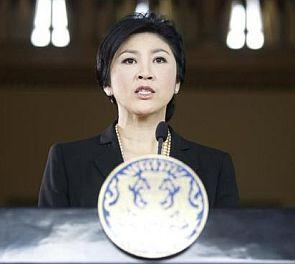 Thailand's embattled Prime Minister Yingluck Shinawatra on Monday sought royal approval to dissolve the parliament and call fresh elections in a bid to defuse the country's deepening political crisis, as thousands of anti-government protesters took to the streets of the Thai capital.
Thailand's embattled Prime Minister Yingluck Shinawatra on Monday sought royal approval to dissolve the parliament and call fresh elections in a bid to defuse the country's deepening political crisis, as thousands of anti-government protesters took to the streets of the Thai capital.
"After listening to opinions from all sides, I have decided to request a royal decree to dissolve Parliament," Yingluck said in a televised statement.
"There will be new elections according to the democratic system," said the 46-year-old prime minister who came to power in 2011.
"The people will decide what the majority wants and who they want to government the country," she said in an effort to defuse the over two-week long crisis.
Under Thai election law, the new vote must take place within the next 60 days.
"I would like to ask every political group and party to use elections under the democratic system to find a solution for the people of Thailand," she added.
Her announcement came as thousands of protesters took to the streets of the Thai capital in a "final showdown" against her government.
Opposition MPs yesterday resigned en masse to join the anti-government protests.
The opposition Democrat Party had said its 153 MPs were resigning from the 500-seat lower house -- a move that does not prevent the ruling Puea Thai party from passing new laws but leaves parliament facing questions about its legitimacy.
Five persons have died and hundreds injured in the anti-government protests in Thailand's worst political turmoil since the 2010 rallies that ended in violence.
In 2010, thousands of "red-shirt" Thaksin supporters occupied key parts of the capital. More than 90 people, mostly civilian protesters, died over the course of the two-month sit-in.
Yingluck said she will remain the head of the interim government.
"The situation seems likely to escalate to violence so the government has decided to return power to the people and let them decide through elections," the prime minister said.
Yingluck said her government has tried its best to settle the crisis and to talk to protesters, who accuse the prime minister of acting as a proxy for her fugitive brother and former premier Thaksin Shinwatra.
Suthep Thaugsuban, the secretary-general of the anti-government People's Democratic Reform Committee who is accused of sedition, however, said the mass rallies will continue until the "Thaksin influence" is uprooted from the country.
Suthep has declared that demonstrators would "blow the final whistle" today in an attempt to topple the government.
Protesters besieged Government House this morning, prompting the authorities to cancel a plan to invite foreign diplomats to observe the situation there.
Satit Wongnongtaey and Tavorn Senieum, protest leaders at DemocracyMonument, demanded the caretaker government to resign following House dissolution.
Satit told protesters that House dissolution was a first victory but was not enough for achieving real democracy and the protests would continue.
He said the People's Democratic Reform Committee wants the people's council to be formed and the caretaker cabinet to resign.
Meanwhile, Thai police has beefed up security at key government agencies and deployed officers on rooftops around rally sites to prevent incidents by third parties wanting to incite violence, a top police official has said.
Deputy Police Commissioner Pol Gen Worapong Chiewpreecha, deputy director of the Centre for Administration of Peace and Order, said police and troops were being deployed to guard key government offices such as Government House and Parliament.
He said late Sunday night that officers would also be deployed on high-rise buildings in the area to watch out for possible attacks by third-party groups.
Police, he said, would also erect concrete barriers and barbed wire around key government offices, but would reduce the areas covered as protected zones.









